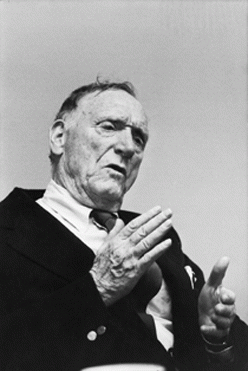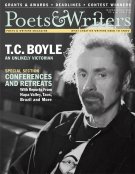During the past year, poets laureate have been the unlikely recipients of national media attention. New Jersey's Amiri Baraka was excoriated for reading a poem that some labeled anti-Semitic, and California's Quincy Troupe resigned after inaccuracies were discovered on his resumé. With their public profiles growing, the role of poets laureate is being called into question. In April the nation's first conference for state poets laureate will convene in Manchester, New Hampshire, where they will discuss poetry and their responsibilities as public representatives of their art.

The conference, "Poetry and Politics: Nations of the Mind," which will be held from April 25 to April 27, is being organized by Marie Harris, New Hampshire's poet laureate, and Katie Goodman, executive director of the New Hampshire Writers' Project, the sponsor of the event, in association with the Academy of American Poets. The goal of the conference is for poets laureate to meet each other, discuss the ambiguities and perceived responsibilities of being a state-endorsed poet, and explore what happens when poetry intersects with politics, education, and community. "Poets laureate are artists in a politically appointed position," Goodman says. "What is it about that singular art form that [necessitates] a political appointment?"
More than 30 state poets laureate have committed to attend the event, which will feature workshops with topics like "Poets and Politicians: Parallel Worlds," "Poetry and Education," and "Poetry and Healing." It will also offer opportunities for discussion and a day of statewide readings during which the visiting poets will travel to meet the people of New Hampshire at libraries, businesses, an opera house, and even a maintenance barn.
Thirty-five states and the District of Columbia have poets laureate, according to Harris. Massachusetts, Minnesota, and Oregon are among the 15 states that have no such program. While the position may bring statewide visibility and a podium to read from, most poets serve without a salary or program budget to support their activities. The few states that do offer a stipend include Rhode Island, which pays $1,000 per year, and California, which pays $10,000 annually. The position is usually appointed by the state's governor's office along with another branch of state government, a state agency, or a community group. Poets laureate can be chosen by state English departments, arts councils, poetry clubs, libraries, poetry societies, literary committees, and writers institutes. Appointments may be for life, as is the case in Florida, or from two to five years.
"It's interesting that so many states have a poet laureate, yet most have not defined the position," says Harris, who was appointed in 1999 for a five-year term in New Hampshire. "Only one or two require something from the poet; most artists who accept this type of position cook up their own plan." During her tenure Harris has organized poetry readings in her community, written poems for state events, and produced a New Hampshire alphabet book, G is for Granite, that unites poetry and state history.
Many poets laureate tend to see their role as educational. Mary Crow says her activities as poet laureate of Colorado include displaying poems on local buses, training graduate students to teach poetry, and "giving awards to local teachers for the innovative use of poetry in the public school classroom." Baron Wormser, the second poet laureate of Maine, says that his laureateship is honorary, with no official responsibilities and no salary, but he is "particularly interested in working with teachers on the teaching of poetry."
George Garrett, serving a two-year appointment in Virginia, pursues dual goals: developing community among poets at all levels and finding new ways to expand the use of poetry in education. Delaware's Fleda Brown reads and speaks at the opening of the state legislature, visits poetry teachers around the state, and reads at six schools each year. "I intend to use my public voice, but within the scope of a good poem, inviting the reader into its world, not declaiming it from a pulpit," she says. Larry Woiwode, poet laureate of North Dakota, says, "A poet laureate should not be a mere figurehead or adornment, but called upon to add dimension to the daily grind of partisan politics."
The loosely defined responsibilities of a poet laureate can sometimes lead to unexpected notoriety. Baraka, who will be attending the conference in April, made headlines after reading his 65-stanza poem Somebody Blew Up America at the 2002 Dodge Poetry Festival. Some found the poem, especially four lines of it, to be anti-Semitic, creating a public brouhaha with ensuing legislative efforts to strip Baraka of his position.
Billy Collins, who is serving a second one-year term as U.S. poet laureate, has an ambivalent view of the poet crowned in laurels. "There seem to be laureates galore in our country; states, cities…even boroughs—Brooklyn has one. We could get to a state of laureate saturation," he says. "If someone calls you up it's kind of an honor, but what does it ask of you? Laureateship is part of our fascination with things British, like the Burberry trench coat. It's our pathetic, sad, postrevolutionary missing of all things British," says Collins, referring to Great Britain's 350-year tradition of poets laureate, who serve lifetime terms there.
But he also acknowledges that laureate programs bring poetry to the public's attention. "The word laureate has resonance in people's minds and it provides a point, a lead dog. Poetry is easier to understand if you have a head of poetry, just like a country needs a leader," he says. For more information about "Poetry and Politics: Nations of the Mind," contact the New Hampshire Writers' Project at (603) 226-6649; nhwp@rcn.com; or visit its Web site at www.nhwritersproject.org.
Denise Hart is a freelance writer in southern New Hampshire.








